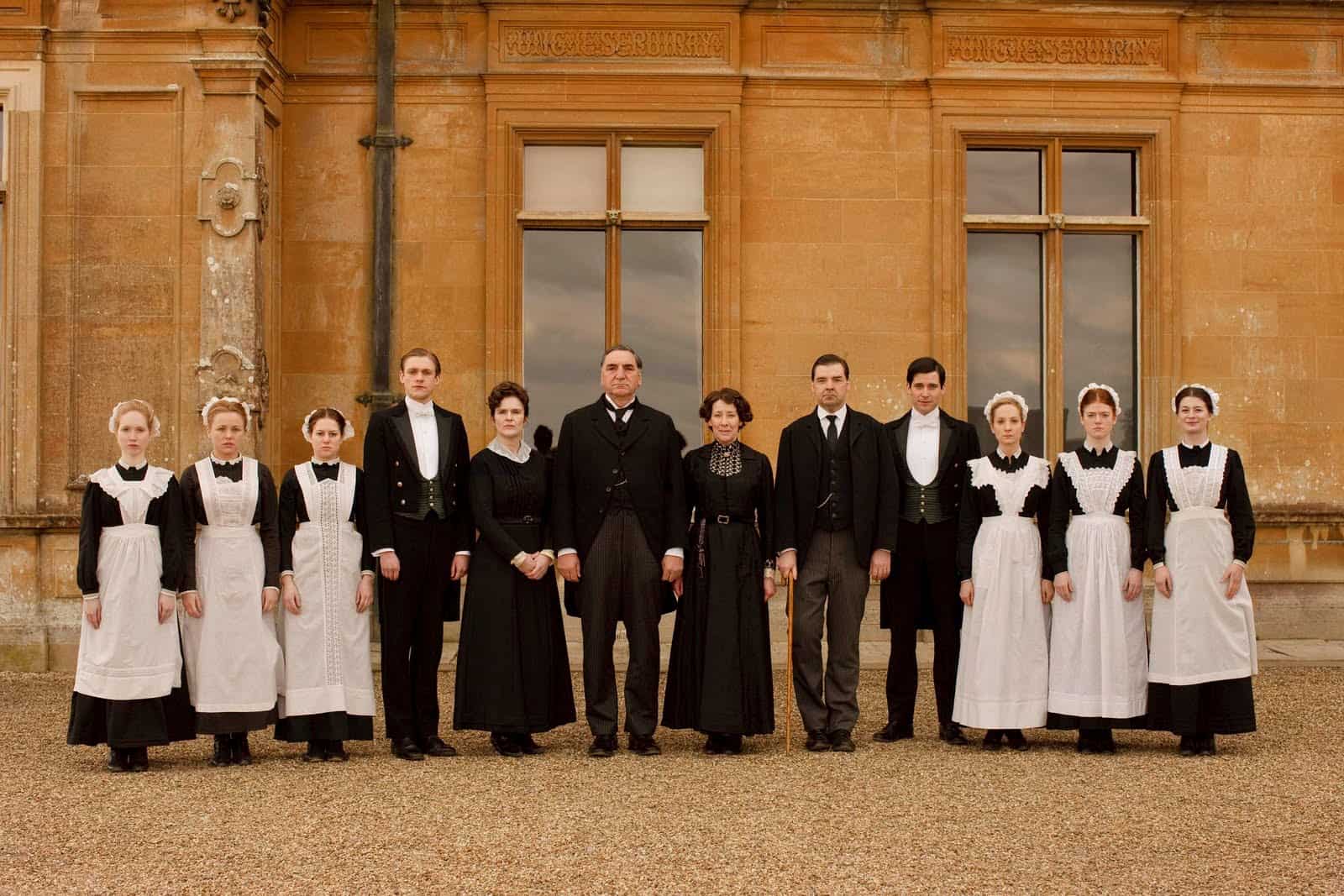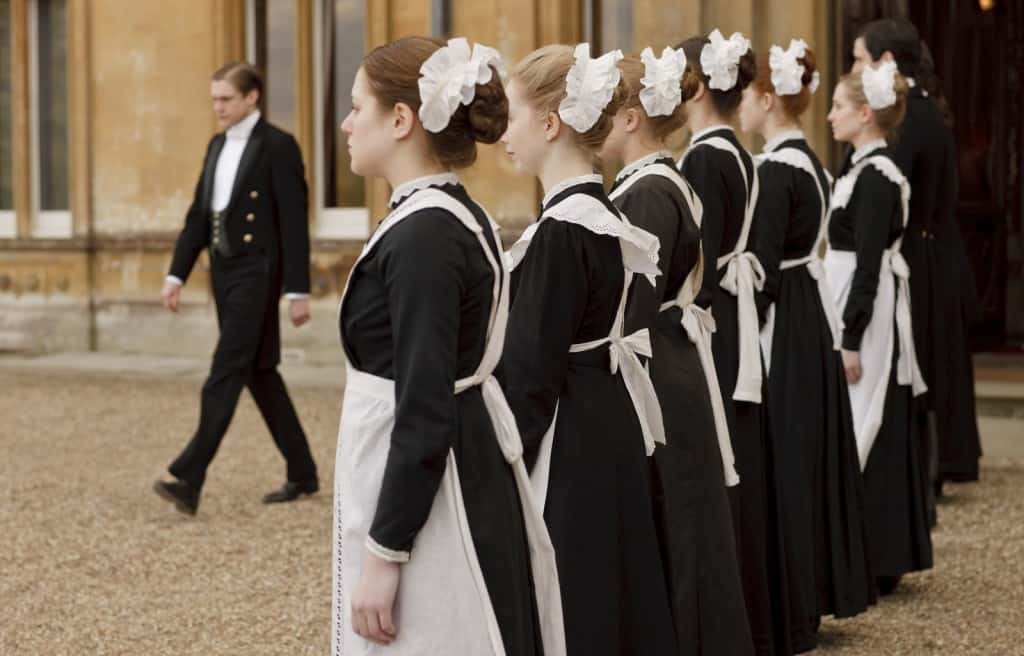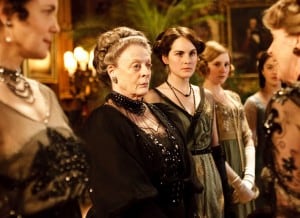I’m an over-the-top “Downton Abbey” fan. Lately I’ve been avoiding all Sunday night engagements (at least those that continue past 9:00 PM ET) and am downcast if I haven’t heard the Dowager Countess’s most recent aperçu. Despite the show’s manifest weaknesses (sorry, but didn’t amnesia go out with Susan Lucci?) and because of its strengths (read: Dame Maggie Smith) I’ve been hooked since Season One. Like most DA fans, I’ve watched “Sh*t the Dowager Countess Says” on Youtube more times than I care to admit, and thought that SNL’s Spike TV parody of the show was, hands downton, the funniest thing I’ve seen all year that didn’t feature Melissa McCarthy.
So why do I feel a little guilty when I, like many Jesuits I know, turn on PBS every week?
In Evelyn Waugh’s novel Brideshead Revisited (and in the popular 1981 TV series as well) the flamboyant Oxford aesthete Anthony Blanche addresses the protagonist Charles Ryder, a budding artist who is besotted with a Catholic noble family, the Marchmains. Over drinks, Blanche darkly warns Ryder against getting too close to Lord and Lady Marchmain and their privileged children. Why? For fear of the “simple, creamy English charm” that will blight Charles’s creativity and his critical faculties.
“It spots and kills anything it touches,” says Blanche, over four Brandy Alexanders. To underline this, Waugh has Blanche repeat his condemnation years later, after he visits an exhibition of Charles’s paintings.
That line stayed with me all these years (yes, I was addicted to “Brideshead” even as a college student). And I sometimes think of it as I take in the costumes and furniture and manners and breeding and general hauteur of the denizens of America’s favorite English country house. Can charm, as Anthony Blanche warned Charles Ryder, blind our critical faculties? Is all forgiven when people are charming, rich and well mannered, or more specifically (and literally in this case), to the manor born? I fear so.
In other words, I feel slightly guilty liking Downton because it celebrates:
1.) Income inequalities. No, I’m not going to get all “Occupy Downton” on you, and yes, I know that the show also concerns on the downstairs staff (whose love lives are as absurdly complex as, to quote “My Fair Lady,” every peer who’s here). But the main allure of the series for the PBS set is the ultra-wealth upstairs characters. In other words, would “Downstairs” have been as popular as “Upstairs, Downstairs”? What about a show focusing on the dutiful Mr. Bates vigorously brushing Lord Grantham’s dinner attire every five minutes? Or a series on the now-I’m-bad-now-I’m-good-now I’m-sorta-bad-again lady’s maid O’Brien helping Lady Grantham fasten another diamond necklace around her upper-class neck?
It’s hard to overlook the fact that we’re watching a show about rich people who have poor people working for them. And don’t seem to mind. As the theologian Sidney Callahan wrote on In All Things: “[O]nce your eyes are fully opened you see the hidden power of class: how it perpetuates privilege while inflicting psychic wounds and cultural deprivation.”
Yes, I know that this season we’re focusing on how much things are “changing” in the aftermath of the First World War, but the Earl of Grantham and his progeny still live in an awfully big house with awfully nice furniture and wear awfully nice clothes. If you really want know how things changed after World War I, dip into Paul Fussell’s magisterial study The Great War and Modern Memory. On the other hand, Fussell’s book, oddly, includes not one of the Dowager Countess’s lines.
2.) Noblesse oblige. Look, Lady Edith Lady Sybil is having a relationship with the chauffeur! (And he’s Irish.) Look, the Earl of Grantham is going to a pub – a pub – to confess his need for his his valet, Bates, as if Bates were on his level. Look, Lady Mary is confiding in her lady’s maid as if they were equals. Viewers (according to some of the DA blogs) seem to thrill when the landed gentry interact with their inferiors, i.e., when the gods and goddesses climb down from Mt. Olympus to speak to mortals.
Yes, there is some genuine affection between the upstairs and downstairs personages, and the relationship between the longtime butler Carson and Lady Mary is one of the more enjoyable in the series. But in actual manor houses, the situation was quite different. For more on that, check out Below Stairs, written in 1968 by Margaret Powell, who was “in service” as a young woman. In her memoir, the former kitchen maid talked about the ever-present divide between “Us” and “Them,” the latter being her former overlords. “We always called them ‘Them,'” wrote Powell, “’Them’ was the enemy, ‘Them’ overworked us, and ‘Them’ underpaid us, and to ‘Them,’ servants were a race apart, a necessary evil.”
Even when the gentry condescend to speak to their inferiors, it’s not much to celebrate. Treating an employee, even a poor one, with respect is a pretty low bar, if you ask me.
3.) Snottiness. This brings me to everyone’s favorite character: the Dowager Countess, or if you must, The Right Honourable Violet Crawley, Countess of Grantham. The earl’s mother is, depending what word you wish to use: waspish, biting or catty. She makes comments that are, take your pick: droll, withering or devastating. But a lot of the time she’s basically, um, mean. Face it: Dame Maggie Smith’s character (a combo of her role as the Countess of Trentham in “Gosford Park” with a little Charlotte Bartlett from “A Room with a View” and Miss Jean Brodie thrown in for good measure) can be snotty.
Here’s what we’re enjoying: her making fun of people who don’t know the “right” thing to do or to say or wear; putting down people without titles; and mocking people from outside a privileged social milieu. NOKD, as some of the preppies used to say when I “went up” to Penn. (Oxford was too far). Not our kind, dear. If you heard her putdowns in real life – say, in your workplace – you’d probably say, “What a jerk.”
But since she boasts an impressive title, has pots of money and dresses well (or is, more precisely, upholstered well) she gets a pass. Rich people, I guess, can be mean.
Maybe I’m wrong, but the fact that these people are titled, wealthy, have exquisite taste, live in magnificent old houses and possess vast tracts of land means that they get away with a lot. Has that “creamy English charm” taken us in? Killed our critical faculties, as Anthony Blanche warned Charles Ryder – or really, as Evelyn Waugh (who himself knew something about class) warned us? I’m afraid so.
So I feel a little guilty watching it. All that cream is probably not good for me.
Editor’s Note: This article originally claimed that Lady Edith was having an affair with the Irish chauffeur when we all know that it’s Lady Sybil who is doing so – how very middle class of us to have made such a mistake.




